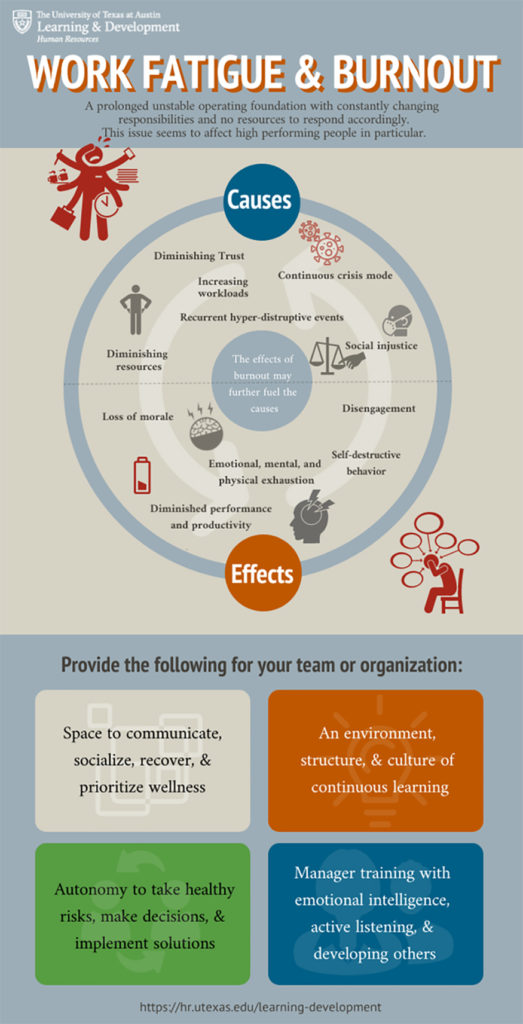U.S. workers are more stressed at work than anyone else in the world. About 57% of U.S. and Canadian workers are feeling stress on a daily basis, up by 8% from the year prior and compared with 43% of people who feel that way globally.
“Right now, we are experiencing a unique strain of burnout. A prolonged period of hyper disruptive events has given rise to a high number of people experiencing mental, physical, and emotional exhaustion,” reports the University of Texas at Austin Human Resources. We keep waiting for a return to “normal” stress levels (however healthy that is), but will that time ever come?
A recent study shows that 45% of Austin workers are more burned out now than they were a year ago. One in three workers in Austin feared unplugging while taking time off this past summer. Now with the return-to-the-workplace in full force, new layers of stress—social anxiety, remaining COVID-19 fears, traffic, childcare, and more—are piling up.
Our recruiters hear an increasing number of complaints from job seekers about being stressed at work and are asked how to find a job that will help them break the stress cycle. Much of the problem stems from burnout.
And here’s the kicker: A job you love can cause major burnout.
Nearly 90% of workers are passionate about their current jobs. Yet, 67% are experiencing burnout and 48% are likely to leave in the next six months because of it. These findings from ResumeLab illustrate the paradigm you may be experiencing yourself. Many of the key drivers of this burnout can be fixed. For instance, 57% of workers said that their burnout was due to being overworked and 31% said it was constant interruptions that have done them in.
Most current employers would rather fix those issues than lose a good worker. For insights on how to approach your manager, check out our previous post on How to Complain to Your Boss. Other reasons—including a toxic workplace (34%) and unrealistic deadlines and expectations (30%) may be indications of a chronically poor workplace culture. In those cases, you could try to work with your manager to turn things around, but chances are, your health and wellbeing could fare better with a new job.
UT Austin offers the following work fatigue and burnout infographic that might you identify triggers that could lead to being stressed at work. Once you have a better understanding of your stress triggers, you can advocate for yourself or seek out jobs that better match your needs.

FIND YOUR NEXT OPPORTUNITY WITH THE HT GROUP
Ready to move your career forward? Connect with The HT Group today!
Our recruiters add the following suggestions to help you reduce being stressed at work, including your back-to-work needs:
- You may be thriving at home and prefer a work-from-home or hybrid schedule. Don’t be afraid to discuss these preferences with your manager or, if you’re looking for a job, your recruiter. About 1 in 4 employees who worked from home during the pandemic would like to stay fully remote. If your job reasonably accommodates it, you may be able to justify the request.
- Perhaps you need the peace-of-mind that only an employer with strict COVID-19 vaccine/testing rules can offer. While the legitimacy of federal or local mandates are being strongly questioned, plenty of employers are opting into mandatory vaccination and/or testing regardless. You may feel best seeking out and working for employers who openly share your viewpoint on the issue (whatever that viewpoint may be).
- Maybe your social skills are stuck back in 2019 and that’s stressing you out? The Wall Street Journal just published a cute “Don’t Be That Awkward Colleague” guide that could help you acclimate to “people” again.
- Perhaps money is weighing on your mind? During the pandemic, the total outstanding consumer debt grew to just under $14.9 trillion, which is an average debt of $92,727 per person. If you haven’t had a pay raise in a while and money has become a big stressor in your life, consider whether you should ask for a pay raise or promotion. Good employers understand these pressures and are doing what they can to meet cost-of-living increases if they can.
There’s no total cure for being stressed at work, but you can take steps to advocate for your mental health and wellbeing. You may be able to strike that balance with your current employer or it could be time to find a new job. Your recruiter can help you decide.




